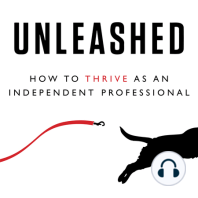38 min listen

544. Ron Lumbra, How to Join a Corporate Board
FromUnleashed - How to Thrive as an Independent Professional
544. Ron Lumbra, How to Join a Corporate Board
FromUnleashed - How to Thrive as an Independent Professional
ratings:
Length:
56 minutes
Released:
Dec 11, 2023
Format:
Podcast episode
Description
In this live event hosted by Umbrex in November 2023, Ron Lumbra, a member of the CEO & Board of Directors Practice and Partner at Heidrick and Struggles, discusses how to get on a corporate board. He shares insider knowledge about the process. The event was recorded as a streaming event, with approximately 300 people signing up for the session. The discussion was facilitated and included questions from attendees. Exploring the Landscape of Board Roles The discussion focuses on the different types of board roles, such as Fortune 500 companies, other public companies, PE-owned portfolio companies, and family-owned companies. The top of the pyramid is the public company corporate board, which is the most sought-after and difficult to join. People often serve on various types of boards, such as large-cap corporations, smaller publicly traded companies, private companies, family businesses, and nonprofits. These boards have similar structures, committee structures, and skills matrix, making them valuable ground training experiences for those looking to join corporate boards. A board is a group of experienced business people who are responsible for running and governing a company. It is not just a group of smart people, but specific roles that a board seeks to fill. He identifies the difference of a philanthropic board. When searching for a board member, companies often seek specific skills, such as financial experts with experience in China, supply chain, or being female. Ron talks about a typical board structure and defines the importance of what a candidate can bring to the board. The board consists of about 10 people, with four or five members fit into the CEO club or those who have run a big business club. The number one in demand skill set is financial experts, with three seats focused on audit and finance committees. The number one skill set is CFOs, while the other three are controllers, treasurers, VPs, SVPs, or audit partners from one of the big four. Companies are also looking for leaders in certain fields at specific times. Generally at present, their expertise in cyber and AI, supply chain, and ESG areas are in demand. Supply chain has seen a surge in demand, especially during the pandemic. Boards are looking for people who can lead, guide, and help with challenges they may face. They create a skills matrix to identify the various skills needed, which is more than the number of seats. People who can check more boxes credibly tend to be more attractive board candidates. The Benefits of Being on a Board Ron explores the reasons people want to be on a board and the benefits they receive. Operating executives with a day job often go on boards to expand their skill set, gain an outside perspective, and learn from others in different industries. As they age, they may consider a different career path and seek ways to contribute, give back, stay engaged, and stay relevant. Age plays a significant role in the decision-making process, as board directors are not employees and are not discussed in the proxy board. Boards typically have a mandatory retirement age of 72-75 years, which varies by company. People usually go on boards in their late 50s or early 60s and have a decade or more of tenure before they age off. Ron also discusses the reality of being on a board in terms of time and commitment. Being on a board is different from being an operating executive, as it is intense and socially intensive. Board culture and how the board functions come together and go apart are important factors, both experience, personality and cultural fit are all factors considered. Board meetings are usually held five times a year, with committee meetings often occurring around them. Ron shares information on payment for board members and how to position oneself to get on a board, particularly at the non-finance 500 level. Securing a Invitation to The Board He explains that the supply side of the board opportunities is what attracts candidates,
Released:
Dec 11, 2023
Format:
Podcast episode
Titles in the series (100)
3. Susan Hamilton - Brand Identity Strategist: Susan Hamilton is a brand identity strategist and a member of Umbrex. She is an alum of Harvard Business School and Boston Consulting Group, and her firm, sh.BRAND, is based in New York City. We talk about what a brand identity is and how Susan helps... by Unleashed - How to Thrive as an Independent Professional